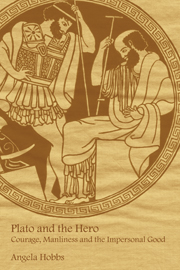Book contents
- Frontmatter
- Contents
- Acknowledgements
- Preface
- Glossary
- 1 The puzzle of Plato's thumos
- 2 Thumos, andreia and the ethics of flourishing
- 3 Arms and the man: andreia in the Laches
- 4 Odd virtue out: courage and goodness in the Protagoras
- 5 Why should I be good? Callicles, Thrasymachus and the egoist challenge
- 6 Heroes and role models: the Apology, Hippias Major and Hippias Minor
- 7 The threat of Achilles
- 8 Plato's response: the valuable as one
- 9 Alcibiades' revenge: thumos in the Symposium
- Epilogue: The weaver's art: andreia in the Politicus and Laws
- Bibliography
- Index
Epilogue: The weaver's art: andreia in the Politicus and Laws
Published online by Cambridge University Press: 01 October 2009
- Frontmatter
- Contents
- Acknowledgements
- Preface
- Glossary
- 1 The puzzle of Plato's thumos
- 2 Thumos, andreia and the ethics of flourishing
- 3 Arms and the man: andreia in the Laches
- 4 Odd virtue out: courage and goodness in the Protagoras
- 5 Why should I be good? Callicles, Thrasymachus and the egoist challenge
- 6 Heroes and role models: the Apology, Hippias Major and Hippias Minor
- 7 The threat of Achilles
- 8 Plato's response: the valuable as one
- 9 Alcibiades' revenge: thumos in the Symposium
- Epilogue: The weaver's art: andreia in the Politicus and Laws
- Bibliography
- Index
Summary
The Republic and the Symposium are not, of course, Plato's last words on andreia. it reappears as an important theme in both the Politicus and the Laws. Yet the Republic is, I would maintain, his most sustained and consistent attempt to bring andreia and sōphrosunē together, chiefly by means of a careful education of thumos. And the Symposium is perhaps the most vivid demonstration of how difficult it is to effect such an education in practice.
Although the later dialogues fall outside the scope of this book, a very brief glance at the rich treatments of andreia in the Politicus and Laws will help to illustrate the radical nature of the Republic's project, and the importance of its theory of the tripartite psuchē. The Politicus, in particular, initially appears to adopt a position diametrically opposed to that (or those) of earlier dialogues on the question of the Unity of the Virtues. In 306a–b the Stranger tells Young Socrates that, in order to understand the statesman's art, it is necessary to explain what many will find a ‘difficult’ and ‘extraordinary’ doctrine, which asserts that the virtue of andreia and the virtue of sōphrosunē ‘are in a way in a condition of great hostility and strife in many things’. These two potentially hostile virtues are, in their turn, to be placed in two opposite classes (eidē) of qualities, and those who possess such qualities also naturally constitute two opposing groups (307c).
- Type
- Chapter
- Information
- Plato and the HeroCourage, Manliness and the Impersonal Good, pp. 262 - 267Publisher: Cambridge University PressPrint publication year: 2000

